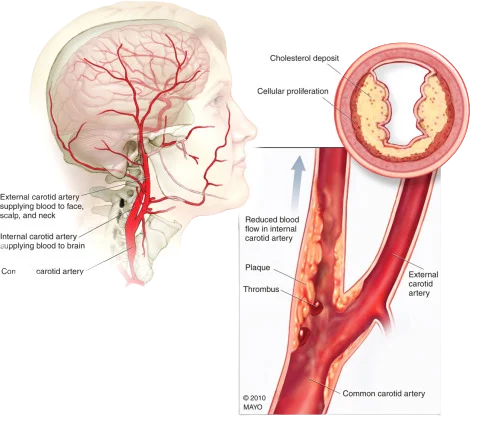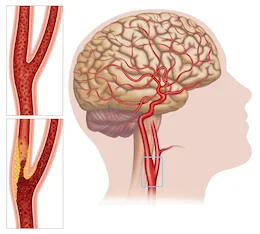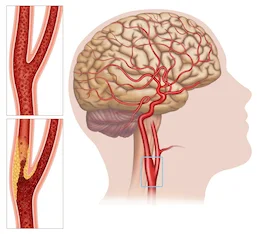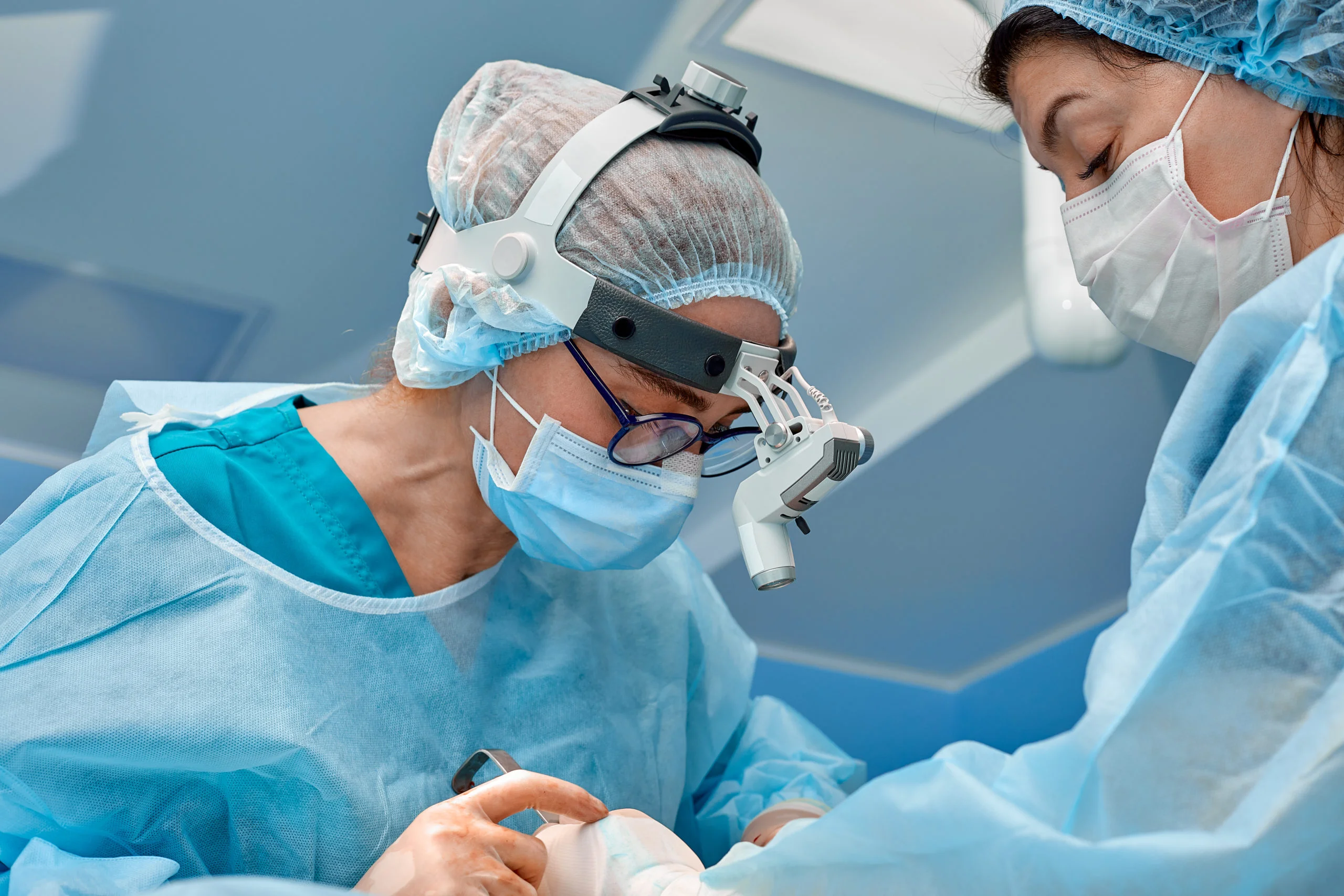Book Your Appointment
Carotid artery disease
Get At Swasthyam Superspeciality Hospital
Carotid artery disease occurs when fatty deposits (plaques) clog the blood vessels that deliver blood to your brain and head (carotid arteries). The blockage increases your risk of stroke, a medical emergency that occurs when the blood supply to the brain is interrupted or seriously reduced.
Stroke deprives your brain of oxygen. Within minutes, brain cells begin to die. Stroke is the most common cause of death and the leading cause of permanent disability in the U.S.
Carotid artery disease develops slowly. The first sign that you have the condition may be a stroke or transient ischemic attack (TIA). A TIA is a temporary shortage of blood flow to your brain.
Treatment of carotid artery disease usually involves a combination of lifestyle changes, medication and sometimes surgery.

Symptoms?
In its early stages, carotid artery disease often doesn’t produce any signs or symptoms. The condition may go unnoticed until it’s serious enough to deprive your brain of blood, causing a stroke or TIA.
Signs and symptoms of a stroke or TIA include:
- Sudden numbness or weakness in the face or limbs, often on only one side of the body
- Sudden trouble speaking and understanding
- Sudden trouble seeing in one or both eyes
- Sudden dizziness or loss of balance
- Sudden, severe headache with no known cause
Causes
Carotid artery disease is caused by a buildup of plaques in arteries that deliver blood to your brain. Plaques are clumps of cholesterol, calcium, fibrous tissue and other cellular debris that gather at microscopic injury sites within the artery. This process is called atherosclerosis.
Carotid arteries that are clogged with plaques are stiff and narrow. Clogged carotid arteries have trouble delivering oxygen and nutrients to vital brain structures that are responsible for your day-to-day functioning.

Causes

Carotid artery disease is caused by a buildup of plaques in arteries that deliver blood to your brain. Plaques are clumps of cholesterol, calcium, fibrous tissue and other cellular debris that gather at microscopic injury sites within the artery. This process is called atherosclerosis.
Carotid arteries that are clogged with plaques are stiff and narrow. Clogged carotid arteries have trouble delivering oxygen and nutrients to vital brain structures that are responsible for your day-to-day functioning.
Risk factors
Factors that increase your risk of carotid artery disease include:
- High blood pressure. Excess pressure on artery walls can weaken them and make them more vulnerable to damage.
- Tobacco use. Nicotine can irritate the inner lining of your arteries. Smoking also increases your heart rate and blood pressure.
- Diabetes. Diabetes lowers your ability to process fats efficiently, placing you at greater risk of high blood pressure and atherosclerosis.
- High blood-fat levels. High levels of low-density lipoprotein cholesterol and high levels of triglycerides, a blood fat, encourage the accumulation of plaques.
- Family history. Your risk of carotid artery disease is higher if a relative has atherosclerosis or coronary artery disease.
- Age. Arteries become less flexible and more prone to injury with age.
- Obesity. Excess weight increases your chances of high blood pressure, atherosclerosis and diabetes.
- Sleep apnea. Spells of stopping breathing at night may increase your risk of stroke.
- Lack of exercise. It contributes to conditions that damage your arteries, including high blood pressure, diabetes and obesity.
Prevention
To prevent or slow the progression of carotid artery disease, consider these suggestions:
- Don’t smoke. Within a few years of quitting, a former smoker’s risk of stroke is similar to a nonsmoker’s.
- Maintain a healthy weight. Being overweight contributes to other risk factors, such as high blood pressure, cardiovascular disease, diabetes and sleep apnea.
- Limit cholesterol and fat. Cutting back on saturated fat, in particular, may reduce the buildup of plaques in your arteries.
- Eat a variety of fruits and vegetables. They contain nutrients such as potassium, folate and antioxidants, which may protect against a TIA or stroke.
- Limit salt. Excess salt (sodium) may increase blood pressure in people who are sensitive to sodium.
- Exercise regularly. Exercise can lower your blood pressure, increase your level of high-density lipoprotein (HDL) cholesterol — the “good” cholesterol — and improve the overall health of your blood vessels and heart.
- Limit alcohol.
- Control chronic conditions. Managing conditions such as diabetes and high blood pressure helps protect your arteries.
Treatment
The goal in treating carotid artery disease is to prevent stroke. Specific treatments depend on the extent of blockage in your carotid arteries.
If blockage is mild to moderate, your doctor may recommend:
- Lifestyle changes to slow the progression of atherosclerosis: Recommendations may include quitting smoking, losing weight, eating healthy foods, reducing salt, and exercising regularly.
- Medication to control blood pressure or lower cholesterol: Your doctor may also recommend taking a daily aspirin or other blood-thinning medication to prevent blood clots.
If blockage is severe, or if you’ve already had a TIA or stroke, your doctor may recommend removing the blockage from the artery.

What is a Vascular Surgery?
Vascular surgery is a dynamic and rapidly expanding specialty that deals with comprehensive diagnostic and therapeutic services for patients with diseases and disorders of the arteries, veins, and lymphatics (circulatory system)
Vascular surgeons manage diseases of the veins and arteries in every part of the body except the brain and the heart.
Vascular surgeons are trained in different kinds of procedures
They can perform open, complicated surgery as well as modern minimally invasive endovascular procedures. So they are often known as vascular & endovascular surgeons or vascular specialists. This helps most vascular specialists to give a balanced opinion, unlike other specialists who usually perform only one type of procedure. Therefore, patients can be assured that they will get the best treatment for their particular needs.
Message Us
Get In touch with us. Ask Any Question or Book Your Appointment Now
Emergency
+91-8600888444
Book An Appointment
0712-2222111
Contact Us
Location
97/98 Vivekanand Nagar, Near Sai Mandir, Wardha Road, Nagpur
Contact for
Emergency :- +91-8600888444
Book An Appointment:- 0712-2222111
For Latest Updates Follow Us On Facebook
